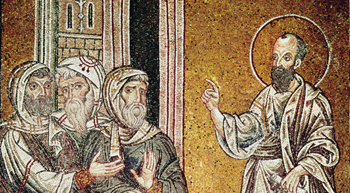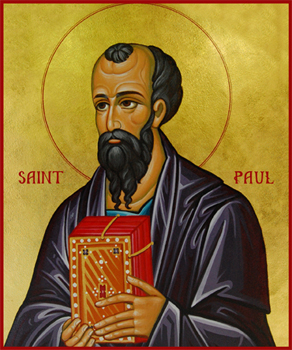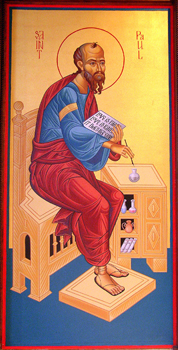For Sunday January 30, 2022
Lectionary Readings (Revised Common Lectionary, Year C)
Jeremiah 1:4-10
Psalm 71:1-6
1 Corinthians 13:1-13
Luke 4:21-30
NOTE: This essay is a reflection on 1st Corinthians 13. For an essay on this week’s Gospel, see “Leaving Home” from the JwJ archives.
Some of the most famous and oft-quoted lines in Scripture come from this week’s epistle: "If I speak in the tongues of mortals and angels, but do not have love, I am a noisy gong or a clanging symbol." "Love is patient, love is kind." "For now we see in a mirror dimly, but then we will see face to face."
Nowadays, we usually hear St. Paul’s poetic “love chapter” quoted at weddings. “Love never ends” appears in calligraphy on creamy-white invitations. Couples meeting at the altar hold hands and promise each other the “greatest” of all gifts. Pastors encourage brides and grooms to “bear, believe, hope, and endure” in a spirit of mutual, self-giving love.
How odd, then, to return this famous Bible passage to its original context, and realize that Paul’s lofty, lyrical letter is not aimed at starry-eyed lovers. Paul isn’t writing to people who cherish and desire each other; he’s writing to people who can’t stand the sight of each other. Paul is no priest at the top of an aisle, waiting to witness and consecrate young love. He’s a frustrated and bewildered spiritual leader, calling an errant and self-destructive church to get its act together before it destroys itself. 1st Corinthians 13 isn’t a wedding homily. It is, in Lutheran priest Nadia Bolz Weber’s words, “a smackdown.”
If you read the first twelve chapters of Paul’s epistle, you get a fairly clear picture of what he’s responding to when he describes the Corinthians’ loveless piety as empty, futile, and discordant. The church has split into factions. People are pitting their favorite religious teachers against each other. Everyone’s vying for power and prominence. Congregants are taking each other to court. The folks who speak in tongues believe they’re superior to those who don’t. People who shouldn’t be sleeping with each other are hooking up shamelessly. Worshippers are fighting over everything from food to circumcision to celibacy to head coverings. The Eucharist has devolved into drunkenness and gluttony, and the poor in the church are going hungry.
 |
In other words, the Corinthian church is a church where all hell has broken loose. Far from honoring each other as fellow members of Christ’s body, the recipients of Paul’s letter are tearing each other apart. While piety, self-righteousness, and spiritual one-upmanship are very much on display in their ranks, the love that never ends is not.
Lest we 21st century Christians think that the Corinthian church’s failings are unique, let’s look more closely at Paul’s “smackdown.” It’s not simply that love must outweigh the obvious “bad” things in our lives. Things like greed, envy, lust, and hatred. Love must even outweigh the “good” things. Spiritual gifts, Paul writes — beautiful, life-giving, church-enhancing gifts given by God himself — are worthless in the absence of love. Prophetic power — the ability to discern the Holy Spirit’s movements in the world, and unveil the hidden truths of our time — is meaningless without love. Knowledge — a deep and comprehensive understanding of all that we consider mysterious or esoteric in our cosmos — is garbage when divorced from love. Faith itself — that much-touted gift the writer of Hebrews describes as, “the assurance of things hoped for, the conviction of things not seen” — is “nothing” without love.
Do we actually believe this? Not in theory, but in practice? Do we really value love more than we value being right? Growing wise? Wielding power? Amassing wealth? Acquiring knowledge? Feeling seen? Doing “good?” In the context of the church, do we really give love primacy over “right” doctrine, beautiful liturgy, eloquent sermonizing, skilled administration, and generous giving?
Before we say yes, we’d do well to notice that Paul’s love chapter has little to say about love as a feeling. The love he describes is robust and dynamic — think verbs, not adjectives. Love is not an emotion. It’s not something we wait around for, or fall into. It is muscle, movement, sweat, action. Love acts patiently and kindly. Love acts against the impulses of envy, irritation, and arrogance. Love yields, love rejoices, love refrains, love endures. In other words, love doesn’t stand around waiting for warm fuzzies; love gets up and gets moving.
 |
What would such intentional and active love have looked like among the ancient Christians in Corinth? Perhaps it would have looked like the poorest members of the church — the slaves, the widows, the orphans — receiving the Communion meal first. Perhaps it would have looked like the parishioners with the most “dazzling” spiritual gifts — the gifts everyone admired — taking a deliberate step back to make room for those whose gifts were historically devalued. Perhaps it would have looked like people honoring and supporting each other’s marriages and bodies. Perhaps it would have looked like people in rival factions gathering for honest, empathic, restorative conversation. Perhaps it would have looked like people helping each other overcome addiction. Perhaps it would have looked like sacrificial hospitality. Perhaps it would have looked like confession, absolution, reconciliation, and amendment of life.
What would the love of 1st Corinthians 13 look like in your context? What does it look like? What does it look like in the places you inhabit, the people you care about, the parishioners you serve?
When I think about Paul sitting down to write about love, I think about a man whose deep and earnest religiosity lead him to sanction intolerance, hatred, violence, and murder — until a shocking encounter with Love on the Damascus road changed everything. I think about a faithful and erudite believer in God who had to be struck blind by Love so he’d finally learn how to see. I think about a man whose zealous faith rendered him a terror before Love transformed him, and taught him how to love and be loved.
Paul is able to write about love with such authority only because he knows firsthand what it can do. When he looks at the trainwreck of the Corinthian church, he’s able to remain hopeful because he knows what God’s love did to his own stony, self-righteous heart.
 |
Perhaps we should stop calling 1st Corinthians 13 the “love chapter,” and call it the “Christ chapter” instead. Because the “love” Paul describes in this lectionary reading is the Christ. It is God incarnate, who bears all things, believes all things, hopes all things, and endures all things. It is Jesus who is patient and kind. Jesus who doesn’t envy, boast, or rejoice in wrongdoing. Jesus whose love will never end.
If this were not true, there would have been no hope for the Corinthian church two thousand years ago, and there would be no hope for us now. Left to ourselves, we cannot love in the ways Paul describes so beautifully. We can’t stop wounding each other, distrusting each other, sabotaging each other, and betraying each other. We can’t stop trying to earn or buy love. We can’t figure out how to recover from cheapened, broken love. We can’t stop falling in love and out of love.
The only hope we have is the hope Paul clung to; the hope that Jesus will love us into loving. That he will be love, in us, around us, through us, and for us. That in his generous, self-giving, cruciform love, we will find a source of life so lavish and plentiful, we’ll be able to give the love of God away, left and right.
Even after everything else in this life fades away, Love will remain. Love in love’s tremulous, searing beauty will remain, and the mirror, clear at last, will show us what we long now to see. Love itself, gazing back at us. The greatest of all things.
Debie Thomas: debie.thomas1@gmail.com
Image credits: (1) Seattle Pacific University; (2) University of Oregon Blogs; and (3) St. Paul Antiochian Orthodox Church, Emmaus, Pennsylvania USA.





